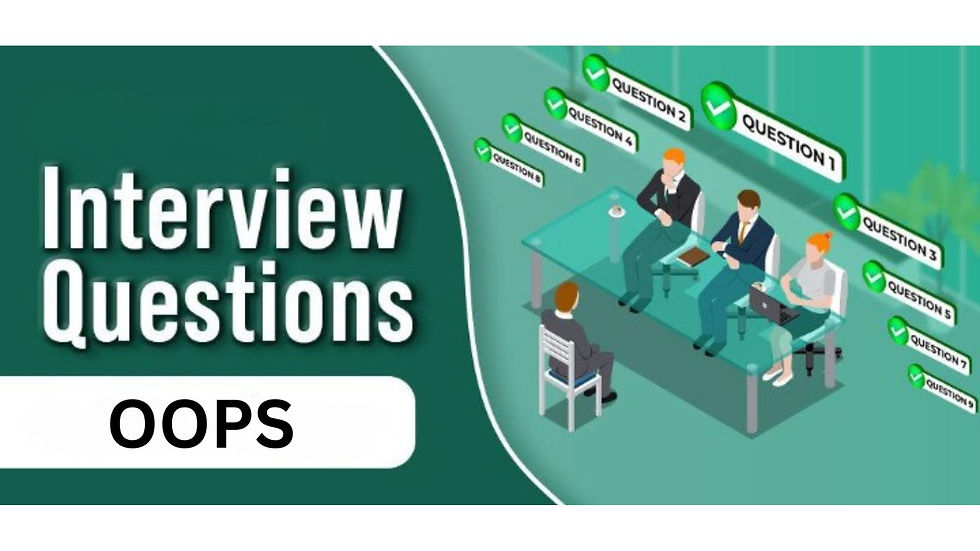How do you prepare for html interview questions and pass the interview on the first try?
- Divyansh WsCube
- Oct 21, 2023
- 3 min read

Introduction
If you're preparing for an HTML interview questions, congratulations on taking the first step toward your dream job in web development. HTML (Hypertext Markup Language) is the foundation of the web, and a strong grasp of its fundamentals is vital for any web developer. To help you pass your HTML interview on the first try, here are some essential tips for effective preparation:
1. Understand the Basics Thoroughly
Start by revisiting the basics of HTML. Make sure you're comfortable with fundamental concepts like HTML tags, elements, attributes, and the structure of an HTML document. Refresh your knowledge of commonly used HTML tags, including headings, paragraphs, links, lists, and images.
2. Embrace HTML5 Features
HTML5 is the latest version of HTML and has introduced many new features and elements. Familiarize yourself with these, such as <header>, <nav>, <section>, and <article>. Be prepared to discuss the benefits and use cases of HTML5 elements in modern web development.
3. Practice Coding
Hands-on experience is invaluable. Create HTML pages, experiment with different elements, and build simple web pages from scratch. This will help you become more comfortable with coding and applying your knowledge.
4. Learn About HTML Semantics
Understanding HTML semantics is crucial for creating accessible and search engine-friendly websites. Study semantic elements like <header>, <footer>, <main>, and <aside>. Be ready to explain how using semantic tags improves web content.
5. Responsive Web Design
With the increasing use of mobile devices, responsive web design is essential. Know how to create responsive layouts using HTML and CSS. Be prepared to discuss the use of meta tags for viewport control and media queries for responsive design.
6. Form Handling
Familiarize yourself with HTML forms, form elements, and attributes. Learn about form validation and how to structure and style forms effectively. Practice creating various forms and understanding their attributes.
7. SEO and HTML
Know how HTML affects search engine optimization (SEO). Study meta tags, alt attributes for images, and semantic markup. Understand the role of structured data and schema.org in enhancing search engine visibility.
8. Cross-Browser Compatibility
Learn how to create HTML code that works consistently across different web browsers. Understand the importance of testing and optimizing web pages for cross-browser compatibility.
9. Accessibility
Web accessibility is essential for ensuring that web content is usable by people with disabilities. Study accessible HTML practices, such as using proper semantic tags and providing text alternatives for non-text content.
10. Additional Tools and Frameworks
While the interview may primarily focus on HTML, having knowledge of related technologies like CSS, JavaScript, and popular web development frameworks (e.g., Bootstrap) can be a plus.
11. Stay Informed About the Latest Trends
Web development is an ever-evolving field. Stay updated on the latest HTML developments and trends, such as Web Components, HTML6, and emerging web standards.
12. Review Sample HTML Interview Questions
Search for sample HTML interview questions online or use resources like web development books, courses, or websites to find practice questions. Try to answer them without looking at the solutions to assess your readiness.
13. Mock Interviews
Consider conducting mock interviews with a friend or colleague, or even practice in front of a mirror. This can help you get comfortable answering questions and explaining your thought process.
14. Compile a Portfolio
If you have past web development projects or code samples, compile them into a portfolio. This can demonstrate your practical skills and provide tangible evidence of your abilities.
15. Interview Etiquette
Don't forget about the non-technical aspects of interviews. Dress professionally, arrive on time, and maintain good communication with your potential employer or interviewer.
Conclusion
Remember, acing an HTML interview is not just about memorizing facts but about demonstrating your understanding and practical skills. During the interview, be clear and concise in your responses, and don't hesitate to ask for clarification if you don't fully understand a question.
With thorough preparation and confidence in your abilities, you can pass your HTML interview on the first try and take a step closer to a successful career in web development. Good luck!



Comments